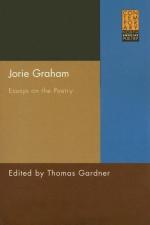|
This section contains 339 words (approx. 2 pages at 300 words per page) |

|
SOURCE: A review of The End of Beauty, in American Poetry Review, Vol. 16, No. 2, March-April, 1987, p. 22.
In the following, excerpt, Boruch praises Graham's poems for their mystical, abstract quality.
In Recitative's interview with Donald Sheehan, Merrill makes the distinction between Eliot, whose poems put "civilization under glass," and Stevens, who "continues to persuade us of having had a private life." Jorie Graham in her astonishing third collection, The End of Beauty, manages both. Like many of Dunn's poems, these are loose meditations, flung onto the page, staged accidents. Yet they are often enactments—frightening and ceremonial as the myths they shadow: Penelope, Orpheus, Eve, Daphne, all drawn with such fierce private light that abruptly it's clear why these stories have been prized for centuries. "But a secret grows, a secret wants to be given away," Graham writes of Eve's lethal plan. "For a long time it swells...
|
This section contains 339 words (approx. 2 pages at 300 words per page) |

|


